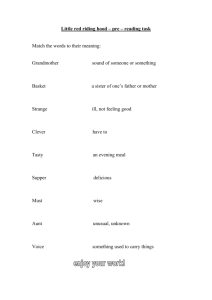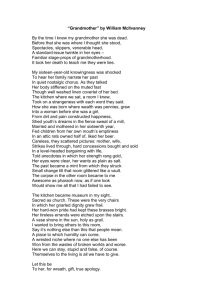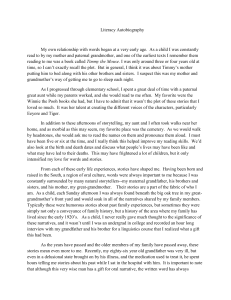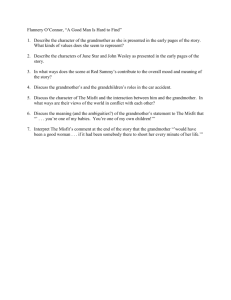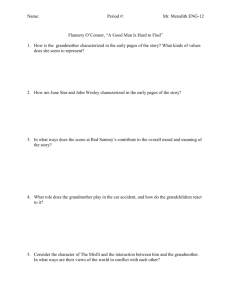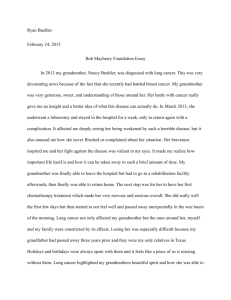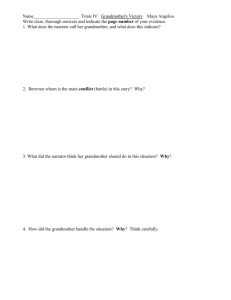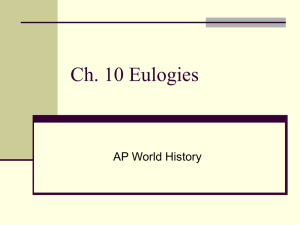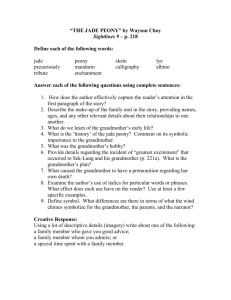esiderata, I learned in library science school, were the items you
advertisement
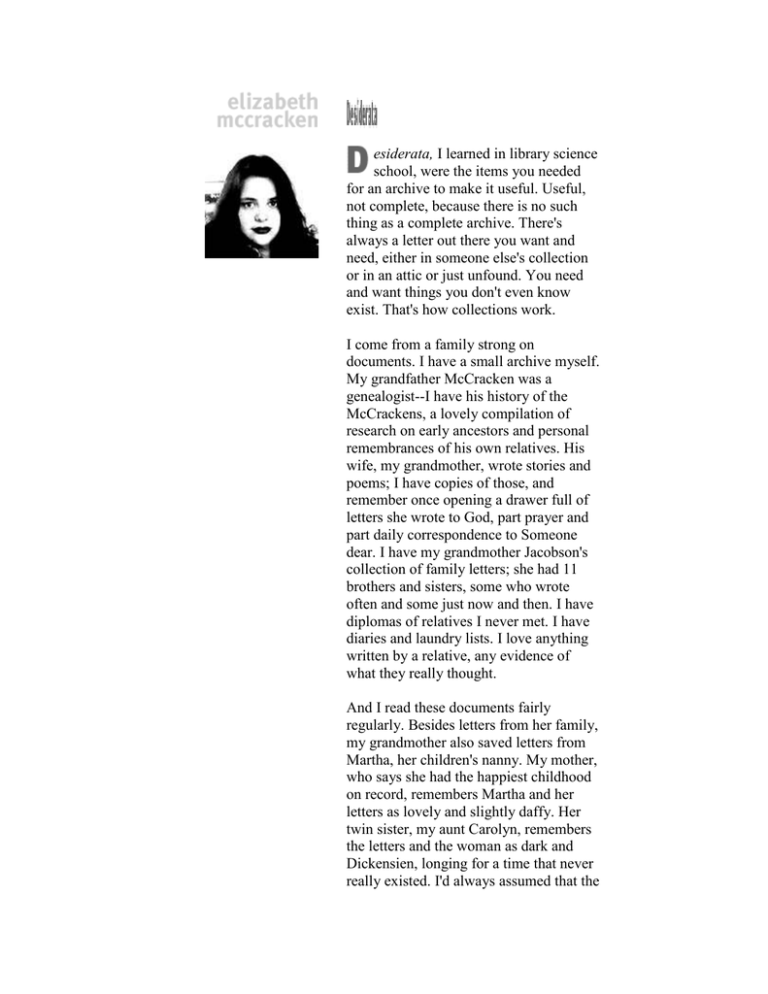
esiderata, I learned in library science school, were the items you needed for an archive to make it useful. Useful, not complete, because there is no such thing as a complete archive. There's always a letter out there you want and need, either in someone else's collection or in an attic or just unfound. You need and want things you don't even know exist. That's how collections work. I come from a family strong on documents. I have a small archive myself. My grandfather McCracken was a genealogist--I have his history of the McCrackens, a lovely compilation of research on early ancestors and personal remembrances of his own relatives. His wife, my grandmother, wrote stories and poems; I have copies of those, and remember once opening a drawer full of letters she wrote to God, part prayer and part daily correspondence to Someone dear. I have my grandmother Jacobson's collection of family letters; she had 11 brothers and sisters, some who wrote often and some just now and then. I have diplomas of relatives I never met. I have diaries and laundry lists. I love anything written by a relative, any evidence of what they really thought. And I read these documents fairly regularly. Besides letters from her family, my grandmother also saved letters from Martha, her children's nanny. My mother, who says she had the happiest childhood on record, remembers Martha and her letters as lovely and slightly daffy. Her twin sister, my aunt Carolyn, remembers the letters and the woman as dark and Dickensien, longing for a time that never really existed. I'd always assumed that the truth was somewhere in the middle, but I have the letters and now know that Martha was, at best, weird. She wrote to my travelling grandmother that the twins-The Dollies, she called them--didn't miss her at all. She reported that she took them out to her mother's farm, and couldn't understand why the girls were so upset to be served for dinner the chicken they'd met earlier. She reported on The Dollies' toilet training as if it were grand opera, and the Dollies heroines who wanted only, desperately, to triumph. I'm glad to know this, I think. Certainly, it's a whole different Martha than the one I knew from my mother's stories. I know Martha now because of all that she reveals of herself, not knowing she was doing it, in her letters. Still, there are many frustrations to family papers. First of all, you may learn things you don't want to know. For instance: some of my grandmother's sisters wanted to sue the widow of one of their brothers. Even in letters from the litigious sisters themselves, this comes across as merely petty and vindictive. There are letters that can break your heart: my Aunt Edna, writing to my grandmother, lamented how poor her health was, how the doctors told her to slow down; I know from the dates that Edna died two weeks later, of a heart attack. But the major frustration is how incomplete everything is, how incomplete people are if you try to meet them this way. The great-aunt who wanted to sue only happened to write it down; maybe she gave up the idea. Maybe she was suffering otherwise--her life was continually tragic in small ways, I know that. Some of the great-aunts I barely know, because they barely wrote. Or rather, I think they barely wrote--my grandmother saved every letter some years, and selected letters others. Perhaps those great-aunts simply never made it into the collection. And then there's my grandmother Jacobson herself She was a wonderful I and complex woman, an attorney and small businessperson who died at home at the age of 90. The pieces of paper I have from her don't conjure her up at all. Her diary (which I don't own but have read) is a very careful record of daily events, nothing more. She doesn't detail worries or doubts, and the fact is she was a worried and somewhat doubtful person. I think she knew that we'd read it, eventually, and didn't want to tell us in her diary anything she hadn't told us already. One piece of paper I do have: a post-it note from late in her life, which she used to mark a recipe in The Jewish Cookbook. It says: coffee bananas bread milk wax beans? and then, in the corner, written diagonally and underlined, lottery ticket. I know that this dates to a time when she was both worried about money and had become very serious about luck. I don't know how superstitious she'd previously been, but about two years before she died, she began to see luck good and bad, in everything: she read her horoscope, her children's horoscope, the horoscope of everyone who might touch her life that day. She believed in fortune cookies. She told her own fortune playing solitaire. And she bought lottery tickets, not so much because she believed she might win but because not playing meant she did not believe that sudden good things could happen. She was a businessperson, after all: she knew what a bad investment that weekly dollar was. I love that little green piece of paper. Desideratum to me, though less than ephemera to anyone else. I could tell dozens of other stories from the pages of family papers: my aunt Blanche's pell-mell record of taking care of her favorite sister, Elizabeth, who was dying of Alzheimer's; Blanche has that disease herself now, and you can see the early signs in these notes. My greatuncles' cheery letters from Europe during World War II. A letter my brother wrote to my grandmother when I was four and he was six, thanking her for a gift and then recording that I was resisting writing a thank-you note myself. Here's a last story. My father's parents were, when I knew them, quiet people. I know now that my version of them is different from anyone else's, but they were my grandparents and I never questioned who I understood them to be. After their deaths, I inherited a cherry chest-of-drawers from their house. I owned this imposing piece of furniture for a few years before I lifted some paper lining from one of the drawers and found a letter. Part of a letter, actually, written by my grandfather to my grandmother before their marriage. It was one of the most beautiful love letters I've ever read, full of delight for her person and for their love together. It was passionate and thrilled and almost disbelieving of his great fortune, to have found her. I never imagined my grandfather, my quiet careful grandfather, was the sort of man who'd write any kind of love letter, never mind this kind. Wrong again. And my grandmother had saved it for more than fifty years. I wondered whether she took it out and reread it from time to time, or whether she'd forgotten where she'd put it. My parents were out of town that weekend, and as it happened I'd agreed to pick them up at the airport. I brought the letter to give to my father--if it meant that much to me, I couldn't imagine what it would mean to him. And so, sitting on a bench in Logan, I gave it to him. "Look what I found," I said. "Oh," he said, perfectly pleased but not surprised. "Another letter. I'll put it with the others." Turns out there were many more--my grandparents had written each other several times a day during their courtship. Which makes it, of course, a happier story. My question is: was that letter more a desideratum for me, or my father? He had the collection, I didn't. Sometimes I regret giving it to him. I've forgotten the exact words my grandfather used, but it doesn't seem right to ask for someone else's love letter back. Someday I'll see it again, I know. Meanwhile, I need it and desire it. I need and desire everything that belongs to my family, and in some ways, I think, that's what I do with my days, writing fiction. I am writing love letters to diaries and post-it notes and telegrams and birthday cards. I am writing love letters to love letters.
